Insuring protections for beekeepers
Beekeepers need to be very clear about the goals of their business endeavors with all parties, including their insurance agent, no matter how big or small the bee farm is.
Read MoreBill and Bonnie Stein have used their experience and knowledge to educate and help other beekeepers get started over the years.
It all started with two apple trees.
Bill and Bonnie Stein, members of Huron County Farm Bureau, had two apple trees in their backyard that weren’t producing well. Unsure why, Bill began discussing it with his brother-in-law, who owned an orchard in Port Clinton.
“He said, ‘It’s probably because you don’t have bees,’” Bill said.
The Steins took his advice and placed two bee hives in their backyard in 1995. That decision not only saved the apple trees, but became the humble beginning of Stein’s Honey.
It wasn’t long before the Steins decided to increase from two hives to six hives. Soon, a local farm market started buying their honey — and that was just the beginning.
“When we started out, it was a lot of trial and error. We talked to other beekeepers and learned a lot from local suppliers,” Bill said. “We’re still learning something different every year and we look forward to learning more as we go.”
The Steins officially moved from hobbyists to business owners in 1998. They started out small, as both Bonnie and Bill were working full-time in addition to beekeeping. Bonnie was employed by the public school system for more than 20 years, and Bill worked in construction for nearly 30 years. Seven years ago, both Bonnie and Bill decided to leave their full-time jobs to focus solely on the bees.
“It got to the point where I was running 550 hives and trying to work a full-time job. It was just too much,” Bill said. “So, when I quit [my job] we kept getting bigger and I couldn’t do the deliveries and other stuff. Bonnie had to quit her job to do the deliveries, so I could focus on the beekeeping part.”
Bill and Bonnie, with help from all three of their kids Josh, Wes and Megan, have grown their honey farm in Collins, Ohio, to more than 1,100 hives throughout the past 27 years.
While their oldest son, Josh, and their daughter, Megan, have moved away to start their careers, their middle son, Wes, has taken an interest in the family business.

“My middle son works locally for a construction company and has about 160 hives of his own and continues to help me because he is closer to home,” Bill said. “Our other two kids helped out a lot when they were younger, but they now live further away, so it’s just my wife and I, and our son, Wes, who helps us a lot.”
And, the next generation is already taking interest.
“Wes has three kids, and one on the way, and his oldest son, Wyatt, who is six, has his own little bee suit and will go out and help,” Bonnie said. “He loves to smoke the hives and he’ll help put medication strips in and all of that.”
Bonnie primarily handles the bottling, labeling, bookkeeping and deliveries. She also helps with extracting honey — that’s when the Steins need all hands on deck.
“I never go into the hives. I leave that up to the guys,” Bonnie said with a laugh.
The Steins’ success doesn’t come without extra effort, however.
Each winter they load up two semi truckloads of their best hives, nearly 900 of them, to be driven to Georgia. They are then relocated to California at the end of January for almond pollination in February, before returning again to Ohio in mid-March.
“We do this to build them up and make them stronger. Last year, when we brought them back, we only had a 22% loss,” Bill said. “Before we took them to California and Georgia, we were sometimes closer to 50 and 60% loss, so it’s definitely worth it.”
According to Peggy Garnes, president of the Ohio State Beekeepers Association and a Medina County Farm Bureau member, there was a time when beekeepers were losing 60 to 80% of their hives every year.
“The bees have a lot of things working against them like viruses, pesticides and mites,” said Garnes, who also has been a beekeeper for the past 25 years. “We’re now able to better care for our bees and better control where they get their pollen.”
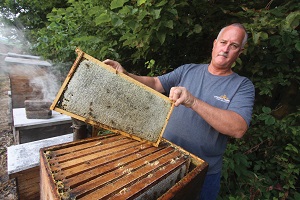 When the hives return, Bill begins splitting hives, removing one-third to half of the bees from a strong hive to create a new hive with a new queen.
When the hives return, Bill begins splitting hives, removing one-third to half of the bees from a strong hive to create a new hive with a new queen.
After the hives have had some time to strengthen, more than 400 of them will be rented out for a short time to local orchards to help pollinate during their bloom, which typically lasts 7-10 days — depending on the weather, of course.
In mid-May the Steins begin to focus on honey production and in June they add honey supers (or frame) and begin extracting honey, which happens from July until mid- to late-August. Last year Stein’s Honey produced more than 84,000 pounds of honey — one of their best years yet.
“It’s a short season, so you wanna take advantage of everything you can,” Bill said. “Sending them to California and Georgia gives us an extra 3-4 weeks to build them up.”
Annually, the Steins sell more than 40,000 bottles of their honey. The honey is sold in 12, 16 and 32 ounce bottles, five pound bottles, gallon jugs and even five gallon buckets.
“Many people will ask why our honey tastes so much better than other honey — that’s because of how we treat it,” Bill said. “Honey does not need to be pasteurized. The only reason they do that is to give it a longer shelf life. And that’s usually not a problem for us. It sells fast enough that it doesn’t usually crystallize.”
Stein’s Honey can be found in more than 60 locations including grocery stores and farmers markets in and around Huron County.
According to Garnes, in the past 10 years, the state has seen a steady increase in the growth of beekeeping, not on the commercial side, but in backyard beekeepers.
“One of the hardest parts the past few years is that beginner beekeepers haven’t had good mentoring opportunities and the beginner classes were not held in person,” Garnes said. “Sure, you get the people being able to talk to you and show you really nice pictures, but it’s not the same as actually getting in a hive with an experienced beekeeper.”
The Steins have used their experience and knowledge to educate and help other beekeepers get started over the years.
“I’ve got a young fellow that’s a freshman this year. He started out with a couple hives a few years ago when he was in seventh or eighth grade. Now he wants to get up to 25 hives and he helps us out a lot,” Bill said. “He’s got the bug and he really likes it and we enjoy helping him learn. That’s how we learned it. So, if we can help anybody else, we’d like to do that.”
The Steins have also done presentations at local libraries and school systems.
“So far this year. we’ve seen a rise in the county-level beginner beekeeping classes,” said Garnes. “People want to learn how to do this.”
And with experienced beekeepers like the Steins around, they certainly can.
What are some things to consider when considering becoming a beekeeper? In a recent Legal with Leah, Ohio Farm Bureau’s Ty Higgins and Policy Counsel Leah Curtis visit about the basics of beekeeping.
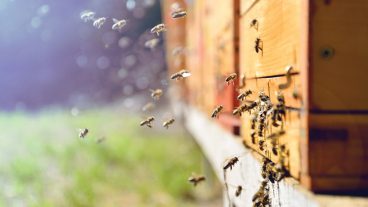
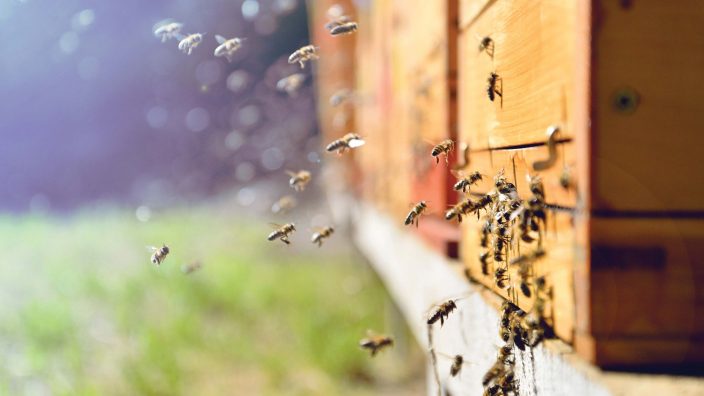
Beekeepers need to be very clear about the goals of their business endeavors with all parties, including their insurance agent, no matter how big or small the bee farm is.
Read More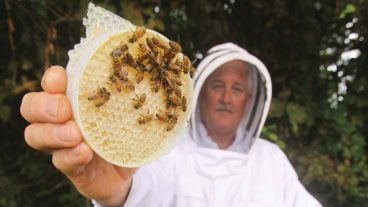
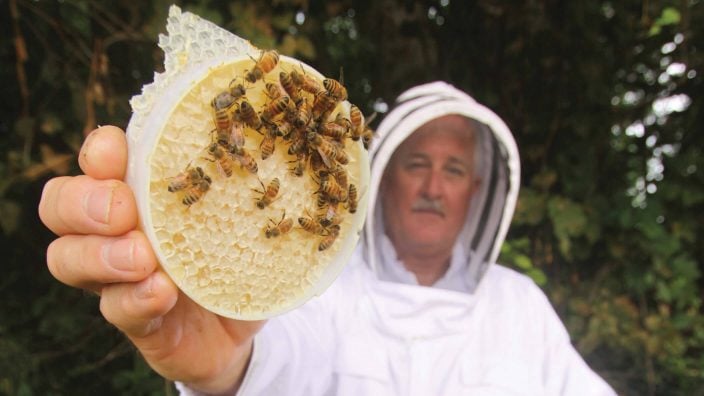
Bill and Bonnie Stein have used their experience and knowledge to educate and help other beekeepers get started over the years.
Read More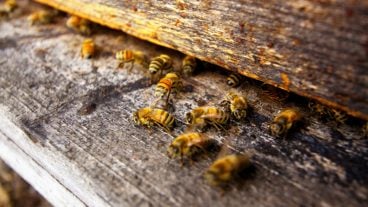
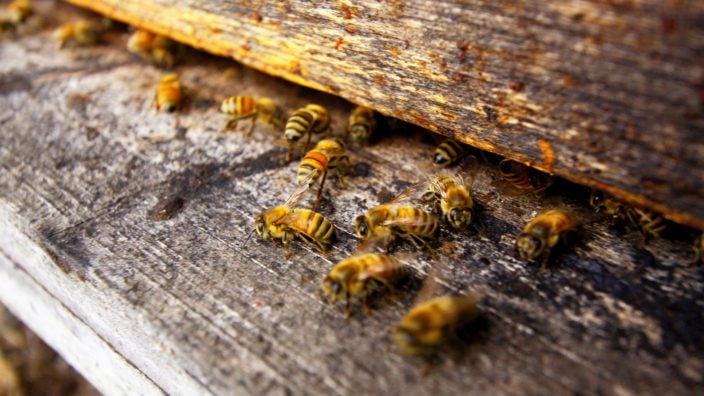
Ohio has seen a steady increase in the growth of beekeeping — particularly in backyard beekeeping.
Read More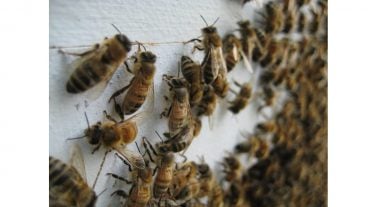
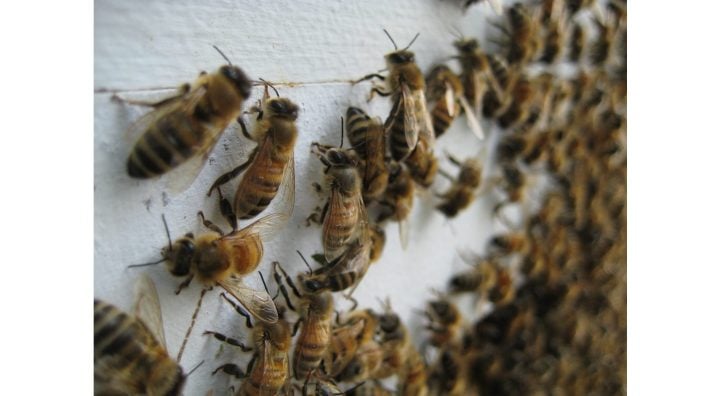
We’re excited to help these new beekeepers learn about beekeeping and the importance of it!
Read More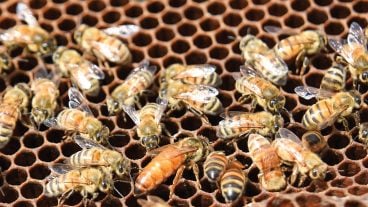
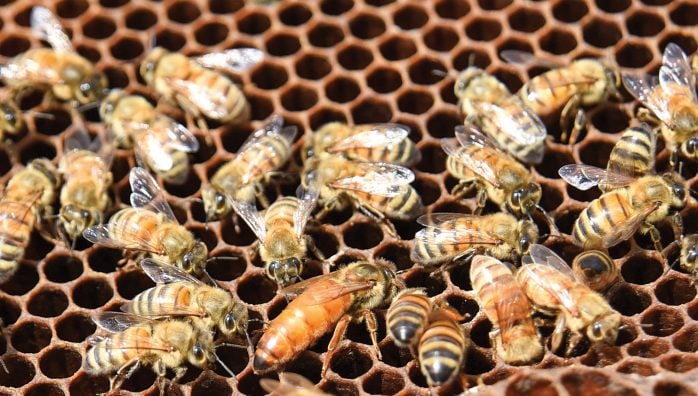
Jim Croskey uses cover crops – largely clover stands – on Dalroy Farms to improve soil health, as chopped forage for the cows, and as fodder for the honey bees.
Read More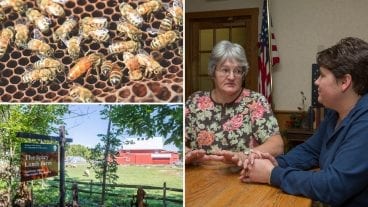
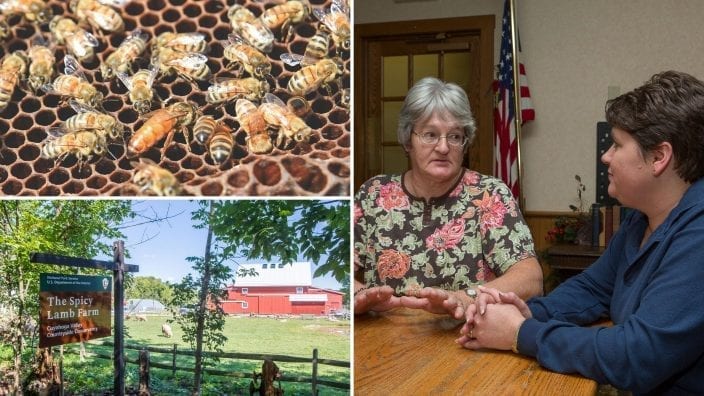
The summer council packet has two new discussion guides; both feature issues briefings directly from American Farm Bureau Federation policy….
Read More